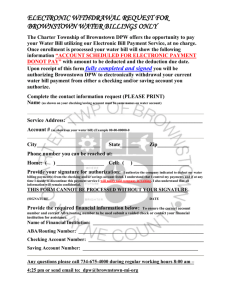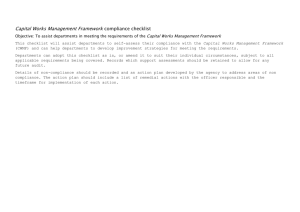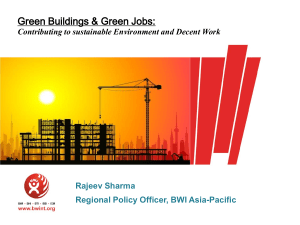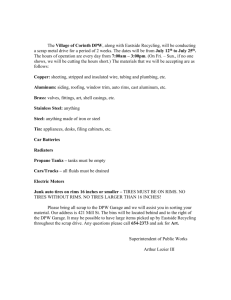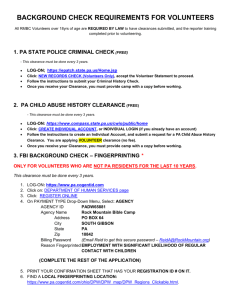Volume 6: MEMORANDUM OF UNDERSTANDING Capacity Building in Energy Efficiency & Renewable Energy
advertisement
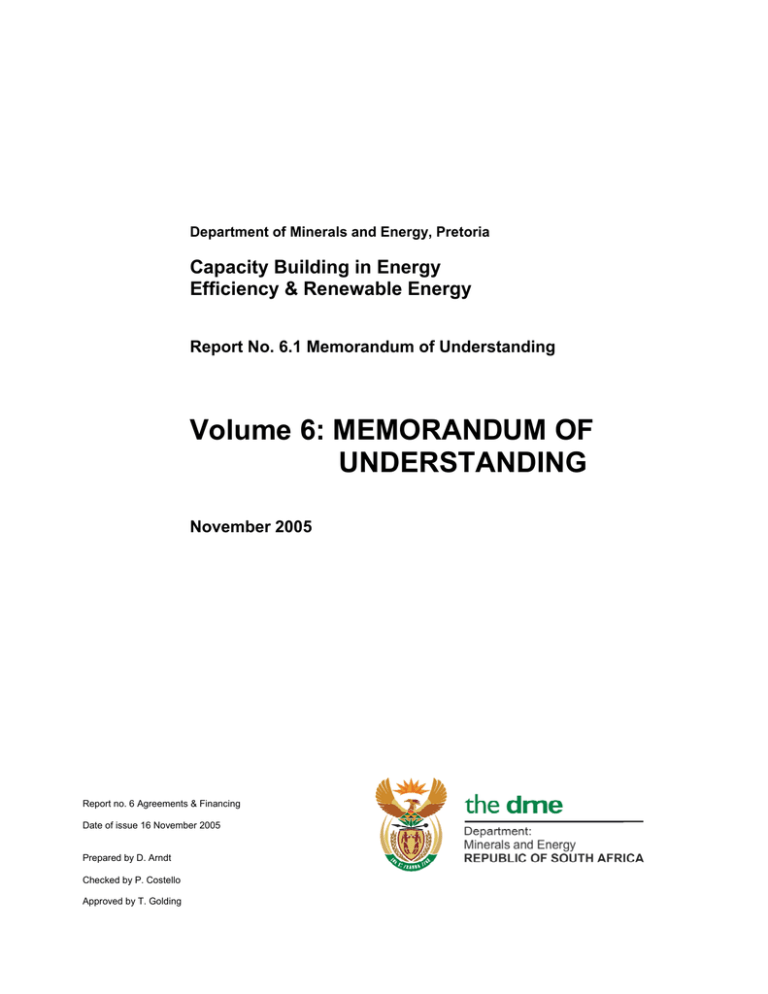
Department of Minerals and Energy, Pretoria Capacity Building in Energy Efficiency & Renewable Energy Report No. 6.1 Memorandum of Understanding Volume 6: MEMORANDUM OF UNDERSTANDING November 2005 Report no. 6 Agreements & Financing Date of issue 16 November 2005 Prepared by D. Arndt Checked by P. Costello Approved by T. Golding MEMORANDUM OF UNDERSTANDING BETWEEN NATIONAL TREASURY AND NATIONAL DEPARTMENT OF PUBLIC WORKS AND DEPARTMENT OF MINERALS AND ENERGY TO SUPPORT ROLLOUT OF ENERGY MANAGEMENT IN BUILDINGS UNDER THE CONTROL OF NATIONAL GOVERNMENT 1 Introduction National Treasury, National Department of Public Works and the Department of Minerals and Energy, in recognition of their mutual commitment to improve the energy efficiency of government buildings, are entering into this Memorandum of Understanding (MOU) in order to support the rollout of energy management in buildings under the control of National Government. Each party is entering into this MOU in order to ensure sustainable energy and energy cost savings in the future. 2 Definitions 2.1 “the Parties” means Treasury, DPW and DME, individually or collectively as the case may be; 2.2 “Treasury” means the National Treasury of the Republic of South Africa or its successor; 2.3 “DPW” means the National Department of Public Works of the Republic of South Africa or its successor; 2.4 “DME” means the Department of Minerals and Energy or its successor; 2.5 “User Departments” means government departments occupying government facilities; 2.6 “MOU” means Memorandum of Understanding between the parties; 2.7 “National Government” means the National Government of the Republic of South Africa or its successor; 2.8 “Government facilities” means all the buildings under the control of the National Government; 2.9 “ESCO” means Energy Service Company; 2.10 “Consultant” means engineering consultant with experience in energy management. 3 Purpose The purpose of this MOU is to identify the interactions and responsibilities of the parties to ensure the successful rollout of energy management in buildings under the control of the National Government. The MOU will clarify the manner in which the parties must co-operate with each other, co-ordinate their functions and promote the consistency of their respective procedures. 4 Background Energy performance contracting has been used successfully in government and private sector operations in the United States, Canada, Australia and Europe for 20 years, but is relatively new in South Africa. In the United States, the Federal Government alone has in place US$5 billion worth of upgrade contracts that are predicted to deliver over US$1 billion in energy savings per year. This is achieved without any impact on the Federal budget, as these projects are funded through third parties. These loans are paid for using the guaranteed savings negotiated with 1 the energy performance contractor. Another US$750 million has been invested in private sector contracts covering schools, hospitals, airports, manufacturing and petrochemicals. In Canada, the Federal buildings initiative has resulted in energy upgrades to 5 500 buildings resulting in a 16 percent reduction in energy use and 18 percent reduction in greenhouse gas emissions. Energy performance contracts are now also being used in other countries around the world, including Japan and Thailand. In Australia, there is a growing capacity to provide this service. New South Wales Government has taken a lead by facilitating the efforts of the Sustainable Energy Development Authority (SEDA). The New South Wales Government has already contracted more than A$9 million worth of upgrades in facilities such as regional hospitals, the Australian Museum and the New South Wales State library. These projects will return over A$1 million in savings per year. The Department of Commerce and Treasury are also now actively supporting energy savings by means of Energy Performance Contracting by offering a grant of A$ 20 million to the Government Departments. In South Africa the Department of Public Works has taken the lead and awarded four Shared savings contracts for the regions: Western Cape, South Gauteng, North Gauteng and Free State. The Western Cape and South Gauteng contracts have already resulted in energy cost savings of more than R40 million since 1998. However, this is a very small percentage of the total energy savings potential still remaining in South Africa’s Government buildings (the other 8 DPW regions). It is therefore very important to have the commitment and the support of all the parties involved to unleash and maintain the remaining energy savings potential still existing in the Government buildings of South Africa. 5 Principles In order to achieve the purpose of this MOU, the parties have adopted and will comply with the principles of the co-operation set out below: 5.1 The parties will at all times support and promote energy efficiency in government facilities. 5.2 The parties will show their commitment by carrying out their responsibilities as stipulated in this MOU. 5.3 The parties will cooperate with each other in mutual trust and good faith. 5.4 The parties will assist and support each other in respect of agreed responsibilities of this agreement. 5.5 The parties will inform each other of, and consult each other on, matters of common interest. 6 Scope This MOU is intended to address all issues related to ensure and fast track the implementation of energy management in the facilities under the management of DPW. The regional DPW offices already engaged in energy contracting will continue under their current contracts until the completion of their contract periods. Those regional DPW offices not currently engaged in energy performance contracting will commit themselves to participate as agreed in this MOU. The National DPW agrees in this MOU to implement energy management in all the regions where viable. 2 7 General Each party will keep the other parties generally informed of its relevant plans and schedules, will respond to the other parties’ requests for information to extent reasonable and practicable, and will strive to recognise and ameliorate to the extent practicable any problems arising from implementation of this MOU. 8 Treasury responsibilities 8.1 Treasury will establish a National Energy Efficiency Fund for Government buildings to finance energy efficient upgrades through performance contracting. The fund shall be for the amount of R50 million per year for a period of 10 years, which shall, subject to the terms and conditions contemplated in this agreement. 8.2 Treasury will actively support energy efficiency by offering a grant to the DPW regions to initiate the implementation process by financing each tender’s, implementation and maintenance costs. 8.3 Treasury will recover the capital utilised for implementing energy savings strategies from future savings though reduced utility budgets (budget rollover). This grant will “fast-track” the implementation of energy efficiency in government departments. 8.4 The DPW will apply for a grant through Treasury to finance the performance contract. The grant award will be based on the scope and price stipulated in the tender proposal provided by the contractor. 9 DPW responsibilities 9.1 Each DPW regional office will select and appoint an engineering consultant to manage the tender process, manage the appointed ESCO and verify the monthly savings. 9.2 Each DPW region will be responsible for financing the tender process, management/savings verification fees (consulting fees) and the required detailed audits fees. 9.3 Each DPW region will select and appoint, with the assistance of the consultant, a qualified ESCO through a thorough tender process, to supply and manage energy efficiency in all viable facilities. 9.4 The DPW will support and assist the appointed consultants and ESCOs to ensure sustainable energy savings. 10 DME responsibilities 10.1 DME will manage and facilitate the rollout of energy management in the buildings under the control of national government. 10.2 DME will develop guidelines and procedures to standardise the implementation process of energy savings strategies in government facilities. 10.3 DME will develop standard agreements and contracts required to engage in energy contracting. 10.4 DME will conduct awareness campaigns in the DPW regions to create the required support and understanding to ensure sustainable future energy savings. 3 10.5 DME will monitor the progress of energy management in the DPWs’ regions and will report to Treasury and DPW on their findings. 10.6 DME will develop and manage a database hosting all the regions monthly energy consumption and energy cost data. 11 Disputes resolution 11.1 Should the parties fail to reach agreement, in which event a dispute between them shall arise, such a dispute may be referred to an Arbitrator to be appointed by the Alternative Dispute Resolution Association of South Africa (ADRASA). 11.2 Such arbitration shall be informal and shall be conducted in accordance with the directions laid down by such arbitrator whose decision in the matter shall be final and binding on the parties. 12 Waiver No failure, delay, relaxation or indulgence on the part of either party in exercising any power or right conferred upon such party in terms of this Agreement shall operate as a waiver of any such power or right, nor shall any single or partial exercise of any such power or right preclude any other or future exercise thereof or the exercise of any other power or right under this Agreement. 13 Variation No variation, modification or waiver of any provision of this agreement, nor consent to any departure by any party there from, shall in any event be of any force or effect unless the same shall be confirmed in writing signed by the other party, and then such variation, modification, waiver or consent shall be effective only in the specific instance, and for the purpose for which, and to the extent to which, it is made or given. SIGNED AT………………………on this…………………….day of……………………….. AS WITNESSES 1. ……………………………… 2. ……………………………… ……………………………. NATIONAL TREASURY 4 SIGNED AT………………………on this…………………….day of……………………….. AS WITNESSES 1. ………………………………. 2. ………………………………. …………………………….. NATIONAL DPW SIGNED AT………………………on this…………………….day of……………………….. AS WITNESSES 1. ………………………………. 2. ………………………………. …………………………….. DME 5
